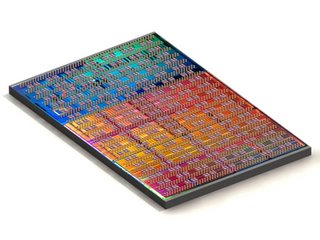


|

|
|
|
Home |
The Mil & Aero Blog
 Posted by John Keller Our community has a lot of board and systems designers who are tearing their hair out over how to cool powerful electronics packaged into tight spaces like unmanned aerial vehicles. Exotic cooling methods such as liquid flow-through cooling and liquid spray cooling, although they are approaching the mainstream, are still complex, expensive, take up space and power, and introduce maintenance issues that most engineers simply would rather not deal with. Now a company in North Carolina called Nextreme Thermal Solutions Inc. has come up with a way to package heat exchangers that are as small as 1 by 1 millimeter. The company, in fact, will start shipping heat exchangers of that size later this month, says Jesko von Windheim, Nextreme's CEO. Board designers are struggling with ways to delay or avoid the switch from conventional cooling methods such as conduction and convection cooling to the exotic liquid approaches, and Nextreme's solution just might do the trick. The technology, which Nextreme calls the Thermal Copper Pillar Bump, can be RoHS compliant, or can be supplied to the military with traditional tin-lead solder. Nextreme's solution, which uses copper pillar bumping used in high-volume electronic packaging, also can generate small amounts of power from ambient heat. It's not enough to power the heat exchangers themselves, but it does have some engineers thinking. Aircraft designers at Boeing, in fact, are considering Nextreme's devices to power the window-darkening feature on the future 787 Dreamliner commercial aircraft. The 787's windows will be one-third larger than conventional jetliner windows, thanks to the aircraft's composite structure, and the windows will be able to lighten and darken a substitute for common aircraft window shades. One of the best areas for Nextreme's tiny heat exchangers is to cool hot spots on chips or on boards. If designers are trying to get the heat out of these troublesome hot spots, they might want to give this a look. Nextreme is on the Web at www.nextremethermal.com. 0 Comments:
<< Home |
Welcome to the lighter side of Military & Aerospace Electronics. This is where our staff recount tales of the strange, the weird, and the otherwise offbeat. We could put news here, but we have the rest of our Website for that. Enjoy our scribblings, and feel free to add your own opinions. You might also get to know us in the process. Proceed at your own risk. 
John Keller is editor-in-chief of Military & Aerospace Electronics magazine, which provides extensive coverage and analysis of enabling electronic and optoelectronic technologies in military, space, and commercial aviation applications. A member of the Military & Aerospace Electronics staff since the magazine's founding in 1989, Mr. Keller took over as chief editor in 1995.  Courtney E. Howard is senior editor of Military & Aerospace Electronics magazine. She is responsible for writing news stories and feature articles for the print publication, as well as composing daily news for the magazine's Website and assembling the weekly electronic newsletter. Her features have appeared in such high-tech trade publications as Military & Aerospace Electronics, Computer Graphics World, Electronic Publishing, Small Times, and The Audio Amateur.
Courtney E. Howard is senior editor of Military & Aerospace Electronics magazine. She is responsible for writing news stories and feature articles for the print publication, as well as composing daily news for the magazine's Website and assembling the weekly electronic newsletter. Her features have appeared in such high-tech trade publications as Military & Aerospace Electronics, Computer Graphics World, Electronic Publishing, Small Times, and The Audio Amateur.
 John McHale is executive editor of Military & Aerospace Electronics magazine, where he has been covering the defense Industry for more than dozen years. During that time he also led PennWell's launches of magazines and shows on homeland security and a defense publication and website in Europe. Mr. McHale has served as chairman of the Military & Aerospace Electronics Forum and its Advisory Council since 2004. He lives in Boston with his golf clubs.
John McHale is executive editor of Military & Aerospace Electronics magazine, where he has been covering the defense Industry for more than dozen years. During that time he also led PennWell's launches of magazines and shows on homeland security and a defense publication and website in Europe. Mr. McHale has served as chairman of the Military & Aerospace Electronics Forum and its Advisory Council since 2004. He lives in Boston with his golf clubs.
Previous PostsArchives
|
|||||
Internet gems
THE MAE WEBSITE AUTHORS ARE SOLELY RESPONSIBLE FOR THE CONTENT AND ACCURACY OF THEIR BLOGS, INCLUDING ANY OPINIONS THEY EXPRESS, AND PENNWELL IS NOT RESPONSIBLE FOR AND HEREBY DISCLAIMS ANY AND ALL LIABILITY FOR THE CONTENT, ITS ACCURACY, AND OPINIONS THAT MAY BE CONTAINED HEREIN. THE CONTENT ON THE MAE WEBSITE MAY BE DATED AND PENNWELL IS UNDER NO OBLIGATION TO PROVIDE UPDATES TO THE INFORMATION INCLUDED HEREIN.
|
||||||
|
|
Home | About Us | Contact Us | Corporate Website | Privacy Policy | Courage and Valor Foundation | Site Map
Also Visit: Laser Focus World | Vision Systems Design | Industrial Laser Solutions Copyright © 2007: PennWell Corporation, Tulsa, OK; All Rights Reserved. | Terms & Conditions | Webmaster |